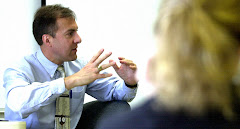I had told her what to do, and she did it — with flourish.
Now I had a lesson that educators don't often have to deal with. I had come upon a teaching moment so enormous, such a wave crashing on the shore that I was feeling the enormity of the sea about to bury me.
I was numb, groping on my hands and knees across the floor of my mind.
Before me was an image that was beyond provocative. It was sexuality so pointed, so calculated in its choice of colors, body positioning, textures of skin surface and angle that it was a dagger.
And it found its home. I was pinned against the wall, eyes wide, hands flailing, legs unable to help me. For I'd walked right into the trap — bondage to a sexual encounter that was bigger than me, bigger than a mere picture.
The assignment had been for my students, under the premise of John Stewart Mill's arguments about freedom (and his opposition of censorship) to find an example of some type of media expression — a word, a phrase, an article, a photograph, a video clip, an entire package of media — that went too far. Freedom is a buzz word in our country. But we have no idea what it really means, particularly in a world where the foundations of morality are eroding under our feet.
The point I wanted to make was that in this world there are messages so sinister, so damaging, so explosive that they deserve some degree of separation from unsuspecting audiences. Some messages are just too much — a category of media, perhaps even of truth-telling, that deserve control — censorship, if that word can be used in any positive sense.
This student had done her research.
She found an advertisement — two, actually by the same advertising agency — promoting a perfume. And as is the case with most advertisements that have done effective market study, that have a firm grasp of socio-cultural, psycho-social needs in a given audience, this was not about fragrance.
This was an example of what the U.S. Supreme Court, as you'll see in this article by Judith A. Silver, would call obscenity — pornography, actually — under the guise of product advertisement. (The problem, of course, coming down to our acceptance of community standards for what is obscene. We lack community; we lack a sense of what obscene really is.)
Movie Day at the Supreme Court or "I Know It When I See It": A History of the Definition of Obscenity
I'd forgotten how pernicious pornography could be. I'd forgotten how it reaches into the mind, the body, the very soul of a man and grips him in ways that are a force beyond human reasoning.The Bible doesn't deal with pornography as such. Marshall McLuhan would say pornography is media. But the grip of pornography is not what appears on a page, or in moving images, or in still-frame images. It's so much more.
The stuff we saw first in Hugh Hefner's magazine, but which is now an international industry of proportions none of us really grasp, is an invitation to fantasy. It is, in its own way, Art. Larry Flynt once told National Public Radio interviewer Terry Gross that Hustler magazine was a celebration of women — a tribute to their beauty, to their place in what, in his world, was a high culture of sexual expression, a beauty of unrestrained erotic ecstasy. But what Larry Flynt was describing was an Art of darkness.
What Larry Flynt didn't say, and that no pornographer will admit — except as an aside in an argument to persuade hapless postmoderns — is that the essence of pornography is bondage to a world of fantasy expectations regarding the relationship of a man to a woman. At its best, it is a room with an entrance but no exit.
And the dirty little secret is that there's no there there. Once you're inside, you're part of a vast emptiness, one you can't get enough of.
The look of pleasure on the faces of those women and men in those pictures, the groaning and murmuring of the women and men in those videos. All of it is fiction. Those women, those men — all of them — are actors. Some actually care (existentially) about what they're depicting; most probably don't. They're in a staged moment: lights, make-up, the works. They drive to the set; they drive home. They're people with a soul, with a mind, with a heart hungry for real relationship. Many of them are deeply lonely.
Sex is not all there is. Passion has an end. After every night of orgy and abandon to the flailing, breathless pleasures in the dark, there is a morning after.
The sun also rises.
The good news for us who know the forgiveness in Christ is that when we see that sun, we know the steadfast love of the Lord never ceases. His mercies, we know, never come to an end. They are new every morning. And his faithfulness is there. But so is judgment.
A price of pornography addiction (even of dipping our toes in the edges of its vast oceanic expanse) is what it does to our eyes, our expectations of relationship, of interaction with women and men (even, oh Lord help us, children) around us — real and on billboards, on pages, in film.
We who inhabit Christian evangelical culture cannot deceive ourselves into thinking that as believers in Christ we can dabble in the fantasies of the mind and media that are destroying the moral foundation of Western civilization.
It must be pointed out that destruction we see around us is not random. It is not just circumstantial devolution. It's the outcome of predatory behavior. It is the result of systematic attack on us by is an enemy who knows us — knows our sexuality, grasps who we think we are better than we do. And this enemy uses media to lure us into the dark, empty box with no door.
None of this is really new. He's been destroying civilizations with it for centuries. Babylon, Greece, Rome, the tribes and peoples of Europe and South America and Asia — all of them wrestled with the concepts inherent in pornographic bondage of our day.
Pornography hurts women, it hurts men, it hurts children.
Biblical admonitions against what the enemy does through pornography can be seen in passages warning us against extramarital sexual encounter. Two of the more prominent are Proverbs 5: 15-23; Proverbs 7:6-27. They're warnings against foolish dabbling in sex outside marriage.
Then there are the warnings about image (pornography, after all, is about what we see even though it's spread to phone sex and cyber-sex and other means we create to connect with others electronically.) The Bible contains scores of warnings in Leviticus, Numbers, Deuteronomy, Judges, and in the lives of David and Saul regarding the ways images draw people astray. And it's not just about idols.
God knows us. He points out the dangers of imagery because He knows our tendency to allow images to turn our attention away from the reality of God in the world — a reality bigger, more vast than any depiction the human mind, even in its God-breathed creativity, could ever form.
Now I have the hard task of helping my students understand that the edge of the volcano is not the best place to be — even if we think we know how to get back from the brink.
If they find themselves standing there at the edge, they should know they are foolish if they do either of the following.
First, they'd be foolish to think sexuality in media is either absent or innocent. Attacks on the male psyche are all around us, infecting every man — young or old, rich or poor — in our country and anywhere else that commercial forces are shaping media messages.
How easily we lapse into lethargy and complacence. How clueless we are about the spiritual warfare raging around us. Just because we leave our weapon at home or never learned how to use it doesn't mean there aren't bullets slamming into the dirt and buildings all around us. We act so shocked when get wounded. ("Why would anybody hurt me — I'm such a nice person?" we ask ourselves. Why? Because the enemy hates the work of God in us. Why hurt nice people? Because they're the easiest to take down.)
So secondly, we're foolish to think we can win all by ourselves. We can't.
This is a battle so much bigger than anything we can muster. We must take this to our knees, to our faces in the dust — to prayer that agrees with God that we are helpless against the monster.
Our mindset must be like the man in the gospel of Mark who threw himself before Jesus and screamed at the torment from which he thought he could never be free (Mark 5:1-15). The irony was that this man's bondage was so penetrating, so fearsome, that the very presence of Christ — the Holy One — created in him a fear, a pleading for the Lord to go away. Why do we do that? Something about intense pain makes us incoherent, unable to see hope. All we know is agony, and those who know our torment.
Jesus healed this man. Jesus freed him from bondage to the demons that drove him to gash himself and run from all who would restrain him, from any who tried to help.
So must we. The Savior of the world is our protector in this world of sexually predatory image-makers and images that lure us from the margins of our minds.

